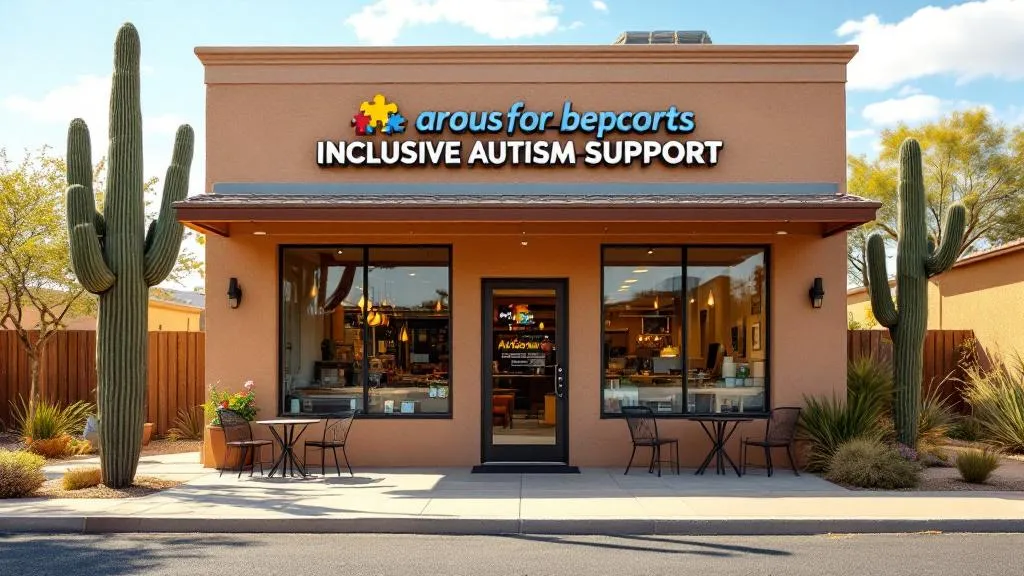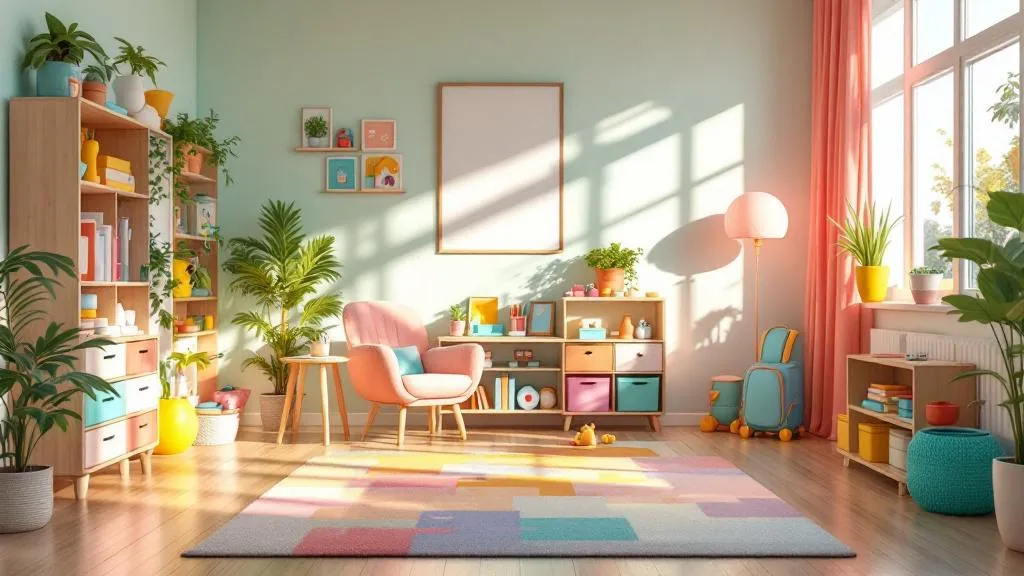How Renewable Energy Helps Autism Households
Harnessing Clean Energy for Autism-Friendly Homes


Exploring Renewable Benefits
Renewable energy is revolutionizing how families affected by autism experience their home and community environments. By replacing traditional energy sources with solar, wind, and other clean technologies, these households benefit financially, improve health, and create supportive atmospheres tailored to the unique needs of individuals with autism.
Financial Savings and Stability
Cost reductions from renewable energy usage
Renewable energy solutions, particularly solar and wind power, play a significant role in reducing household energy costs. Families affected by autism can see substantial savings, as these technologies help decrease monthly utility bills and promote financial stability. For instance:
- Solar power can lower electricity bills by up to 50%, providing families with the opportunity to better allocate their limited financial resources.
- Community solar projects offer an inclusive approach, enabling families to benefit from collective energy savings of about 5-20% without needing personal installations.
- Job creation in the green energy sector also positively influences local economies, providing more employment opportunities and economic engagement for autism households.
Impact on household finances for autism families
The financial benefits derived from transitioning to renewable energy extend beyond mere cost savings. Families can redirect the funds saved on utility bills towards essential services such as therapy and medical care for their loved ones. Some notable points include:
- Households adopting renewable energy can allocate resources to enhancing communication technologies, improving independent living skills for individuals with autism.
- Renewable energy helps reduce operational costs of autism support centers, allowing for expanded services that cater to the unique needs of their clientele.
- Reduced greenhouse gas emissions contribute to overall health improvements, leading to fewer medical expenses over time.
In summary, the shift to renewable energy sources not only improves the living conditions for individuals on the autism spectrum but also promotes greater financial freedom, fostering a more supportive and sustainable environment for families.
Health and Environmental Benefits

Enhanced Air Quality
Renewable energy sources, like solar and wind power, significantly improve air quality by reducing harmful emissions from fossil fuels. This is particularly crucial for individuals with autism, who can be highly sensitive to their environments. Cleaner air can alleviate respiratory issues often exacerbated by pollution, fostering a healthier living space for families.
Reduction of Pollutants
With the decline in greenhouse gases and other pollutants, families utilizing renewable energy technologies can experience a dramatic decrease in environmental toxins. This change is advantageous, especially for children with Autism Spectrum Disorder (ASD), as exposure to pollutants is linked to cognitive and behavioral challenges.
Impact on Autism-Related Health Issues
Transitioning to clean energy sources can lead to significant improvements in health outcomes for individuals affected by autism. Enhanced air quality reduces anxiety and stress levels, contributing to better emotional well-being. Furthermore, renewable energy projects often create quiet, low-stimulation environments conducive to learning and focus, which is beneficial for children with autism.
| Aspect | Impact on Health | Importance for Autism |
|---|---|---|
| Improved Air Quality | Reduces respiratory issues | Essential for minimizing sensitivities |
| Reduction of Pollutants | Enhances overall health | Mitigates cognitive and behavioral issues |
| Clean Energy Implementation | Fosters consistency in living environments | Supports routines, reduces stress |
Understanding these benefits helps highlight the importance of transitioning to renewable energy, especially for autism households that require stable, healthy living conditions.
Creating Calmer Living Environments

Reducing Sensory Overload
The integration of renewable energy sources like solar and wind power creates quieter and low-stimulation environments essential for children with autism. By minimizing background noise and utilizing sound-absorbing materials, these settings can significantly reduce sensory overload. Smart technology, such as adjustable thermostats and energy-efficient lighting, further enhances this tranquility by allowing families to tailor their spaces to individual sensory needs.
Additionally, improved air quality resulting from renewable energy implementation helps alleviate respiratory issues and reduce anxiety linked to environmental toxins. Clean energy solutions can lead to fewer disturbances, providing a stable environment conducive to emotional well-being—an essential aspect of managing autism.
Improving Concentration for Autistic Individuals
Renewable energy not only addresses environmental concerns but also fosters conditions that enhance focus and reduce anxiety. Energy-efficient lighting options, like LED bulbs, minimize glare and provide optimal brightness, all while maintaining a comfortable atmosphere. With stable indoor temperatures supported by smart systems, individuals with autism can benefit from a consistent environment that helps improve their concentration.
Ultimately, by creating calming spaces enriched with clean energy technologies, we see significant positive impacts on the emotional and psychological welfare of individuals with autism.
Building Supportive Communities
Community-wide Renewable Energy Initiatives
Communities that embrace renewable energy solutions, such as solar and wind power, create supportive environments that significantly benefit families with autism. By facilitating community-wide projects, such as community solar installations, families can access clean energy without the high upfront costs associated with individual systems. These communal efforts can lead to approximate savings of 5-20% on electricity bills, offering crucial financial relief to households managing autism-related expenses.
Impact on Autism Households
The transition to renewable energy is particularly beneficial for autism households. A stable, eco-friendly energy supply promotes healthier living conditions with improved air quality, reducing pollutants that can worsen health issues sensitive to individuals on the autism spectrum. These improvements often foster a quieter, more comfortable home environment, minimizing sensory overload—a common challenge for those affected by autism.
Furthermore, as communities invest in renewable energy, they create spaces infused with sustainability principles. Schools can incorporate eco-friendly designs, enhancing learning experiences for children with autism. The availability of renewable energy also supports job creation, stimulating local economies and providing economic opportunities for families, further enhancing their quality of life.
Summary Table of Community Renewable Energy Benefits for Autism Households
| Benefit | Description | Example Impact |
|---|---|---|
| Cost Savings | Reduced utility bills due to community projects | Families save 5-20% on energy costs |
| Improved Air Quality | Reduction of pollutants enhancing health | Better respiratory health for individuals with autism |
| Noise Reduction | Quieter environments minimizing sensory overload | Calmer living conditions |
| Job Creation | Economic opportunities within the green energy sector | Increased community engagement |
Communities that strategically adopt renewable energy initiatives not only enhance their environmental footprint but also become pillars of support for families navigating the complexities of autism.
Implementing Smart Technologies
Role of Smart Home Devices
Smart home technologies can profoundly transform the living conditions of families with individuals on the autism spectrum. By integrating devices like smart thermostats and energy-efficient lighting systems, families can create a tailored environment that caters to specific sensory needs. For instance, adjustable lighting can help minimize glare and discomfort, which is essential for those who are sensitive to light.
Moreover, smart home systems allow for greater control over the living environment by enabling parents or caretakers to adjust settings remotely or set automated schedules, thereby providing a consistent atmosphere crucial for emotional stability.
Independence for Individuals with Autism
These innovations foster a sense of independence for individuals with autism. Technologies that automate routine activities—such as turning off lights or adjusting temperatures—help users manage their environment without constant assistance, promoting self-sufficiency. Tools like communication apps can further enhance autonomy by assisting in daily task organization and supporting self-care skills.
Through the strategic use of smart home devices, families can create a harmonious living space that not only supports the unique needs of individuals with autism but also encourages their personal growth and independence.
Reliable and Consistent Energy Supply
Minimizing Disruptions
A reliable and consistent energy supply is crucial for autism households. Individuals with autism often thrive in stable environments where routine is paramount. Renewable energy sources, such as solar and wind power, provide a steady flow of electricity, reducing instances of power outages that can disrupt daily life. This consistency fosters an atmosphere where families can maintain their schedules, contributing significantly to emotional well-being.
Ensuring Stable Routines
Without unexpected interruptions in power, essential routines—like therapy sessions, meal times, and quiet hours—remain unaltered. Families experiencing fewer disruptions can focus more on nurturing their loved ones, as consistent energy supply allows for better management of daily activities. Moreover, renewable energy solutions can lead to improved indoor conditions, such as stable temperatures and adequate lighting, enhancing comfort for individuals with autism. This organized environment not only supports their emotional needs but also enables families to allocate more resources to essential therapies and activities.
Enhancing Physical Health
Reducing Indoor Air Pollutants
Renewable energy sources, such as solar and wind power, have a notable impact on indoor air quality. By reducing harmful emissions that exacerbate air pollution, these clean energy technologies create healthier environments for individuals with autism, who often face heightened sensitivities to their surroundings. Improved air quality can lead to significant benefits, decreasing the likelihood of respiratory issues and enhancing overall health.
Impact on Autism-Related Health Needs
The adoption of clean energy solutions directly addresses several autism-related health challenges. Families benefiting from renewable energy experience fewer harmful indoor pollutants, which is particularly crucial for children with Autism Spectrum Disorder (ASD) linked to sensitivities. Continuous exposure to cleaner air can lead to positive behavioral outcomes, reducing anxiety and improving mood. Moreover, by lowering utility bills, families can reallocate funds towards essential autism care services, supporting better health and wellness.
| Benefit | Description | Impact on Autism Health |
|---|---|---|
| Reduced Air Pollutants | Cleaner air from renewable energy technologies | Decreased respiratory issues |
| Financial Savings | Lower utility costs from clean energy adoption | More resources for therapies and essential services |
| Enhanced Well-being | Improved indoor environments promote health | Better mood and reduced anxiety |
Financial Assistance and Accessibility

Funding Opportunities for Renewable Energy
Integrating renewable energy sources into autism households can lead to significant financial relief, but the initial investment can be daunting. Various funding opportunities exist, such as grants, tax credits, and local programs designed to ease this burden. Families can often access financial assistance for solar panel installation and other renewable technologies that can drastically reduce energy costs.
Many states offer incentives specifically targeted at families with special needs, ensuring that transitioning to sustainable energy is feasible and beneficial. In addition, community solar projects provide an appealing alternative for those unable to install individual systems—these initiatives allow families to share in the energy produced, yielding 5-20% savings on utility bills.
Increasing Access to Renewable Technologies
Increasing access to renewable technologies is vital for families affected by autism. Many organizations and nonprofits are stepping up to provide education and resources on sustainable energy solutions. These efforts not only promote financial savings but also build awareness of the advantages renewable energy brings to the physical environment, such as improved air quality and quieter living spaces.
The integration of renewable energy in autism care centers also reflects a growing trend in sustainability, as these facilities report significant operational cost reductions—allowing for budgets to be reallocated toward essential services. By focusing on accessibility and financial support, families can better navigate the adoption of renewable energy technologies, ultimately enhancing their quality of life.
Job Creation and Economic Growth

Economic Benefits of Clean Energy Sectors
The transition to renewable energy is not only about environmental sustainability; it also fosters economic growth, especially for families affected by autism. The green energy sector has been shown to create a range of job opportunities, helping to stimulate local economies. These jobs can vary from installation and maintenance of solar panels to more advanced roles in energy project management.
Engaging in clean energy industries offers families with autism new economic avenues. As these sectors expand, job security increases, providing financial stability for households that often face significant therapy and medical expenses, averaging up to $60,000 annually.
Community Engagement
Communities investing in renewable energy often see a boost in community engagement. Programs focused on sustainability can unite families and professionals, enhancing social interaction and support networks. Initiatives like community solar projects allow families to participate in green energy without needing individual installations. This can lead to savings on electricity bills, enhancing financial relief for autism households.
Moreover, adopting renewable technologies in communal spaces nurtures an environment of collaboration and awareness, equipping families with vital resources while fostering connections that improve overall well-being.
Long-term Environmental and Economic Benefits

Sustainability Practices
Adopting renewable energy sources provides profound long-term benefits for households, especially those affected by autism. Families can integrate solar photovoltaic (PV) panels, significantly decreasing utility bills while ensuring cleaner energy usage.
Other sustainable practices include installing solar water heaters and utilizing geothermal heat pumps to enhance indoor comfort without compromising the environment. Through energy audits, households can identify efficiency improvements necessary before these installations. Such practices not only support a stable power supply but also promote a tranquil atmosphere, ideal for children on the autism spectrum.
Future Outlook for Autism-Friendly Innovations
The future of renewable energy offers promising innovations for autism households. As technology advances, solutions like smart home automation systems will allow families to customize lighting and heating based on individual sensory needs. This can lead to enhanced emotional well-being by minimizing sensory overload and supporting routines that are crucial for individuals with autism.
Investments in eco-friendly energy technologies are expected to grow, providing even more accessible options for families. As communities embrace sustainability, initiatives that create sensory-friendly environments will likely see increased support, ensuring an inclusive atmosphere for autism households.
In summary, renewable energy represents not just a necessary shift toward environmental responsibility, but also a pivotal opportunity for enhancing daily life for families affected by autism.
Future Potential of Renewable Energy
Renewable energy offers autism households the potential to create healthier, more supportive, and economically stable environments. By adopting clean energy solutions, these families can significantly enhance their quality of life, ensuring that both immediate and long-term needs of autistic individuals are met in a sustainable and inclusive manner.
References
Does Your Child Have An Autism Diagnosis?
Learn More About How ABA Therapy Can Help
Find More Articles

10 Autism-Friendly Activities in and Around Charlotte, NC

Autism in Charlotte: What the Numbers Reveal (2025)

Teaching coping strategies with ABA

Using ABA to improve attention to task

What is response blocking in ABA

How to support children with anxiety using behavior strategies

How to write effective behavior goals

The role of data collection in ABA decision-making

How to teach goal-setting to older children

How to teach turn-taking using ABA

How to identify triggers for challenging behavior

Understanding prompt hierarchy in ABA

Common myths about ABA therapy debunked

Behavioral strategies for addressing compulsive behavior

The science behind reinforcement in ABA therapy

ABA tips for co-regulation with caregivers

Teaching perspective-taking to children with autism

Teaching abstract concepts like time using ABA

Building independence in older autistic individuals

Strategies for working through therapy resistance

Do Amish Kids Get Autism? Are They Vaccinated?

Using ABA to teach vocational skills

How to use chaining to teach multi-step tasks

Can ABA therapy help with social skills development in teens

What are motivating operations in ABA

Teaching honesty and truthfulness through ABA

Tips for managing caregiver stress during ABA therapy

Can ABA support emotional regulation in autistic children

ABA strategies for addressing excessive reassurance-seeking

Supporting children during puberty with behavior supports

Using ABA to support bilingual or multilingual children

How to identify overly rigid behaviors

How to assess for progress beyond behavior

Tips for setting up your home for ABA success

How to support autistic children in group learning settings

Teaching effective help-seeking behavior

What is instructional control and why it matters

How therapists assess progress in ABA programs

What is behavioral contrast in ABA

How to build motivation for difficult tasks

Supporting attention span through ABA

Teaching context clues in social settings

Using ABA to help with sensory-seeking behaviors

Supporting transitions from therapy to school independently

How to support early learners in group ABA sessions

Using role-playing to teach social situations

Supporting generalization of academic skills

What to do when reinforcement stops working

What to expect during an ABA reassessment

Sensory-friendly spaces and their role in supporting autistic children

ABA approaches to reduce property destruction

ABA approaches to reducing impulsive behaviors

ABA strategies for building study habits

5 Autistic Child Traits by the Age of 3

Odds of Second Child Also Being Autistic

Odds Of Having A Child With Autism By Age

Does Living In A City Cause Autism?

Strengths and Abilities In Autism

Sensory Processing Disorder vs. Autism

Does Tilly Green Have Autism?

Which Parent Carries The Autism Gene?

What Is The Autism Society Of North Carolina?

Do Plastic Toys Cause Autism?

Autism Prevalence In North Carolina

Signs & Symptoms of Autism in Teens

Does Emotional Neglect Cause Autism?

Does The Good Doctor Have Autism?

Does Cerebral Palsy Cause Autism?

Does My Child Have Autism?

What Happens If Autism Is Not Treated?

Is it Worth Getting An Autism Diagnosis?

Do Autistic People Talk To Themselves?

Why Do Autistic People Like Trains?

Why Do Autistic People Wear Headphones?

Does My Boyfriend Have Autism?

Does My Boyfriend Have Autism?

What Is Action Behavior Centers?

Free ABA Therapy Services for My Child With Autism

What Happens To Severely Autistic Adults?

Can You Join The Military With Autism?

Is Your Autistic Adult Child Ready To Move Out?

Movies & TV Shows About Autism

Raising A Child With Autism

Autism Prevalence In Indiana

Is Arizona A Good State For Autism?
Contact us
North Carolina, Tennessee, Nevada, New Jersey, Utah, Virginia
New Hampshire, Maine
Massachusetts, Indiana, Arizona, Georgia
.avif)















